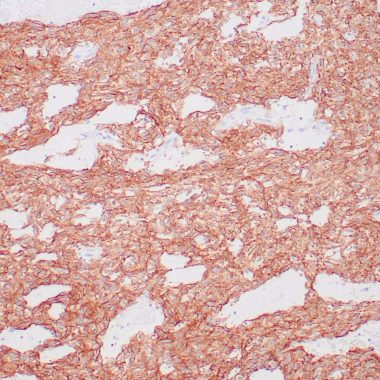DOG1 gene, a gastrointestinal stromal tumor (GIST) specific gene, encoding for the hypothetical protein FLJ10261, which was named “Discovered on GIST 1” (DOG1). DOG1 protein is expressed ubiquitously in gastrointestinal stromal tumors irrespective of KIT or PDGFRa mutation status. DOG1-1 monoclonal antibody yielded positive staining in 95% GIST. For special GISTs, DOG1 immunoreactivity was detected in 79%, while only 9% stained for CD117; in 36% KIT-negative GISTs; in 100% NF1-associated GISTs; and in 82% pediatric GISTs. In addition, DOG1.1 immunoreactivity was seen in fewer cases of carcinoma, melanoma, and seminoma as compared with KIT mutation. Therefore, DOG1.1 is a sensitive and specific immunohistochemical marker for GIST, comparable with KIT, with the additional benefit of detecting KIT-negative GISTs. DOG1.1 is also a sensitive marker for unusual GIST subgroups lacking KIT or PDGFRA mutations. In tumors that are negative for both KIT and DOG1.1, mutational screening may be required to confirm the diagnosis of GIST.
